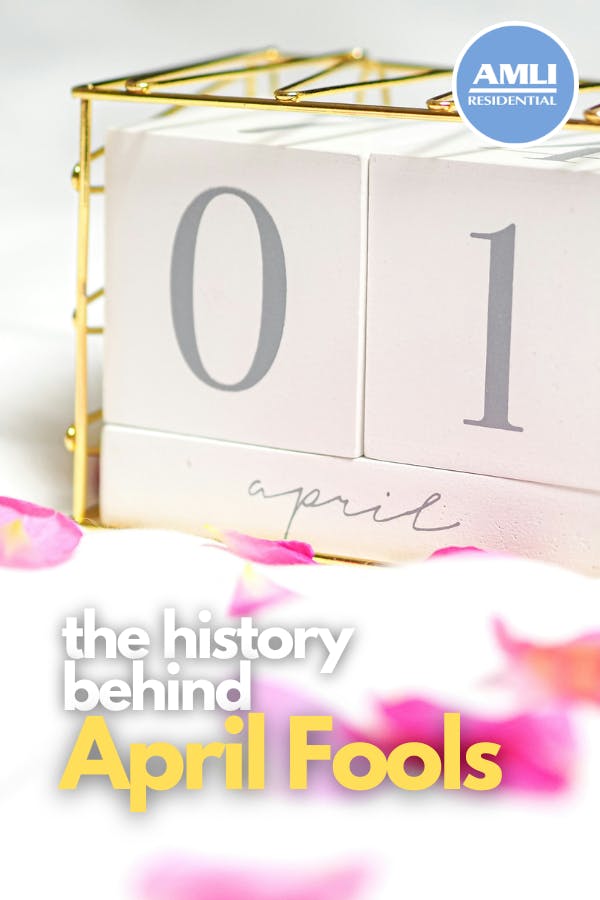“The First of April some do say
Is set apart for all Fool’s Day
But why the people call it so
Nor I nor they themselves do know.”
— an excerpt from a 1760 publication of “Poor Robin's Almanac”
April Fools’ Day has been around for a while, but take any origin story you hear about it with a grain of salt. No one is really sure how or when it first came about, and there may well never be a way to know!
There are stories, to be sure, and they’re pretty believable ones. Many origin stories surrounding April Fools’ Day have their roots in historical events, festivals and beliefs that we know to be true, but trying to figure out how this pranking holiday fits into all of it is tricky. We may never know the first April fool or the first prank pulled, but what more can we expect from a day shrouded in tricks, secrets, pranks and jokes?
Here are just a few of those origin stories that attempt to explain April Fools’ Day. And, true or not, they’re certainly a part of what the celebration has become today!
History and pranks pulled on April Fools’ Day
Possible origins of April Fools’ Day
The Ancient Roman Festival of Hilaria
One theory places the origin of April Fools' Day in ancient Rome. Certain cults within the ancient Greco-Roman world celebrated the day of Hilaria each year around March 25th as part of a larger, longer festival that honored Cybele, the Great Mother of the Gods. The day of Hilaria involved merriment, games and masquerades while celebrating the spring equinox — and while not directly linked to pranks, the playful spirit of Hilaria could be seen as a distant ancestor of the lighthearted chaos that defines April Fools' Day.
The switch to the Gregorian Calendar
Another theory points to a major shift in calendar systems during the 16th century.
For much of ancient history, the years had been measured from the equinoxes and solstices within the solar calendar. The spring equinox symbolized rebirth, new life and fresh starts and, as such, was seen as the start of the new year. In the Roman republican calendar, March 25 was celebrated as the start of the new year and was the start of the religious and civil calendar long after the Julian calendar was adopted in 45 B.C.
However, with the adoption of the Gregorian Calendar in 1564, January 1 became the official start of the year for many nations. Some people, still clung to the old traditions, celebrating the New Year in late March and early April. These folks became known as "April fools" and were subjected to good-natured teasing and pranks.
French fish
France also features prominently in a separate popular origin theory. The French term for April Fool's Day is "Poisson d'avril" which translates to "April Fish.” The earliest documented reference to this term comes from a 1508 poem by Eloy D’Amerval, in which he uses the phrase “Fish of April” to refer to a foolish person. The exact symbolism of the fish is unclear, but some speculate the term refers to the young, hungry fish that emerge at the beginning of spring and, as such, are easily caught. Thus, a gullible person falls for a prank in the same way a gullible fish falls for a worm — hook, line and sinker.
Either way, modern-day celebrations of April Fools’ Day in France and French-speaking countries involve attempting to pin a paper fish onto someone’s back, effectively branding them the “April’s Fish.”
Noah’s Ark
One of the theories floating around out there is that the dove sent out from Noah’s Ark in the Bible represents the first fool’s errand. A paragraph taken from a 1796 print of the London ‘Public Advertiser’ article and quoted in a 1908 editorial of ‘Harper’s Weekly’ sums up the theory well:
"The mistake of Noah sending the dove out of the ark before the water had abated, on the first day of April, and to perpetuate the memory of this deliverance it was thought proper, whoever forgot so remarkable a circumstance, to punish them by sending them upon some sleeveless errand similar to that ineffectual message upon which the bird was sent by the patriarch.”
This is more a theory than anything, as there’s no evidence of anyone prior to 1796 linking the dove in the story to the modern-day celebration of April Fools’ Day.
False spring
Another theory connecting trickery with early April delves into the symbolism of spring.
April 1 falls around the beginning of spring in the Northern Hemisphere and, if you live anywhere where the seasons change drastically throughout the year, the season is nothing if not a tease. This time of year is often associated with unpredictable weather patterns, characterized by sudden shifts between sunshine and showers and warm and cold temperatures. Some historians suggest that this whimsical nature of spring might be reflected in the lighthearted trickery of April Fools' Day, but there’s not quite enough evidence to create a solid connection.
The first official references to April Fools’ Day
The first solid reference to playing pranks on April 1 comes from a Flemish poem written by Eduard De Dene in 1561. In the poem, a man sends his servant out on a series of “fool’s errands” as a prank because it is the first day of April.
This type of prank — sending people out on fruitless errands — is the kind of prank that endured for most of recorded April Fools’ history. Records from Germany, England and France from the 17th and 18th century show that April 1 was a common prank day, and by 1771 there was a printed record of April Fools’ Day pranks in Canada and the United States.
Since then, the holiday has evolved in the European and North American countries in which it’s still celebrated and, for better or for worse, has resulted in some memorable pranks!
Famous April Fools’ Day pranks
Here are a few famous April Fools’ Day pranks that have been pulled on the public over the years!
Helium at King’s College Choir
If you were ever on Vine in its heyday, you’ll recognize this prank! In 2014, King’s College Choir in Cambridge released a video stating that treble singers would be replaced with singers who inhaled helium to reach their high notes.
Flying penguins
The British Broadcasting Corporation (BBC) aired a segment on April 1, 2008 following a newly-discovered colony of penguins that regularly flew to the Amazon to migrate. It should have been obvious to all the people who believed it that it was a prank as soon as Monty Python member Terry Jones showed up on screen!
Panda-monium
A Taiwanese newspaper fooled its readers in 2009 after saying that the two pandas donated to the Taipei Zoo were, in fact, two brown bears dyed black and white. People were understandably concerned.
The 1957 Spaghetti tree hoax
In 1957, the BBC's "Panorama" program fooled viewers with a documentary-style report on Swiss farmers harvesting spaghetti from trees. The report explained the eradication of the "spaghetti weevil" pest, allowing for a bountiful spaghetti harvest. Many viewers, unfamiliar with the tradition of April Fools' Day pranks, were utterly convinced, and the BBC received numerous inquiries about cultivating their own spaghetti trees!
Here are some more great April Fools pranks, courtesy of the BBC!
Smellovision
This one falls somewhere between prank and marketing ploy. In the 1960s, there were several attempts to introduce "smellovision" technology for cinemas that allowed viewers to smell what was happening on screen. These were often April Fools' Day jokes, (again, courtesy of the BBC), but some companies did genuinely explore the idea.
The Netherlands’ television tax
This clever prank pulled by a public broadcasting company in the Netherlands announced that police would be roaming the streets with special scanners that would indicate whether or not someone had paid their radio or television tax — and the only way to stump the scanners was to wrap your radio or TV in aluminum foil.
Surprise, surprise: the next day, stores were sold out of aluminum foil and a host of missing taxes had been submitted!
The Great Blue Hill eruption
This 1964 prank by Boston radio station WNAC-TV caused some serious panic in the community. The station reported a volcanic eruption at Great Blue Hill, a small hill in Milton, MA. Complete with fake eyewitness reports and sound effects, the prank caused widespread panic before the truth was revealed and the producer was fired.
Bad prank, dude.
Over-specific Netflix categories
This one is more recent, but a great example of lighthearted, funny pranks that companies pull on their customers. Next time April 1 rolls around, check your Netflix to see if any new over-specific categories have popped up, such as Surreal Ballets Based on a William Shatner Album which consists entirely of several copies of “Gonzo Ballet,” or Movies that Are in English But Still Require Subtitles.
Plus, don’t forget the gripping, action-packed films Netflix released in 2014, the likes of which included “Rotisserie Chicken” and “Sizzling Bacon,” both clocking in at 73 minutes and 20 minutes, respectively. They were exactly what you think they were.
April Fools' Day continues to be a popular tradition as a day to embrace lighthearted fun and a touch of good-natured mischief. Whether its origins lie in ancient Roman festivals, calendar shifts, easily-caught fish or simply the human love of a good prank, April Fools' Day reminds us not to take ourselves too seriously and to find little moments of joy in our everyday life.
Happy April Fools’ Day!
Pin it!

Featured photo by Laura Chouette on Unsplash


 View All Posts by Colleen Ford
View All Posts by Colleen Ford